I am an independent scholar and author with no institutional funding. Please, consider supporting me on Patreon so I can continue to do the work. Thank you!
Reading list
Introduction to my reading list:
In this section, I would like to introduce only the books that I feel strongly about, the ones I believe are important. I am not wasting your or my time on book reviews or on “selling” books for the sake of books. If you haven’t come across these titles yet, I hope that this list will be helpful.
But before proceeding, here a few words on the book industry itself. Even though I am a product of literary culture, which I love and in which I much too thoroughly indulge – in fact during my conception, my parents held books in their hands – I am constantly battling with the forces of print capitalism, that protect the rights of large publishing houses to make huge profit at the expense of many aspects of our world, forests and people, not least of which is the toil and suffering of writers, most of whom don’t even have a chance to get access to the publishing “market”. In addition, print capitalism, just like in your classic Marxist analysis of alienation, has succeeded in creating an image of intellectual labour, including emotions and the spiritual aspect, as commodity – a product in its own right. There are promotion parties organised by book stores and publishers where we may rarely get a glimpse of an author trying to sell – but it ends there. And this is the ultimate alienation, that of readers from writers, of writers from books, of books from writers, of everyone from everyone and most sadly from the environment that bleeds.
I therefore encourage the samizdat publications in all their form. Use libraries, virtual or public. And before anything else, support the authors themselves. For a true writer a book never ends, never becomes a “product”, a “commodity”. It is a process of truth, of destiny and the giving of love.
I understand that some books may mean that much to readers too. These are the books that one needs to keep, to debate with on its margins in pencil or ink and to return to as we grow along. In the end, if you can’t buy these books directly from the authors, you can purchase them here, from Amazon, by clicking on the images.
For an additional in-depth analysis of Moominbooks, Winnie-the-Pooh, Charlie and the Chocolate Factory, Dunno and Friends, and other children’s books, see part II of my doctoral dissertation (published in The Paulinian Compass, June 2010) titled:
You can also find other essays on children’s literature in my preliminary exam section and other essays on childhood and education on my home page.
Tayeb Salih Season of Migration to the North / The Wedding of Zein.
This is a Sudanese author whose books transcend the boundaries of culture, time and geography even when he writes about village life in Northern Sudan. He presents this world with depth and yet it sparkles with humour and wit while conveying love and respect for these, much too human, characters. The Season of Migration to the North was at one point acclaimed as THE novel of the 20th century Arabic literature. It tells a poignant story of a narrator who returns to his native village in the North of Sudan after several years of higher education in England to meet a mysterious character who reveals to him his own relationship to colonialism, education, racism, and the classical Arabic literary question that deals with the demarcation of reason and madness. A beautiful read that transcends culture and society in our striving for flight towards true human freedom, beyond politics and beyond our social and individual constraints.
Tayeb Salih The Wedding of Zein
is a beautiful story of a village fool, witty and funny of spirit yet ugly of face. He beams upon his fellow villagers with laughter that reflects the wisdom and love shared in that village society. There is only one person before whom he appears in a different light and that is his beloved Na’ima. His falling in love with Na’ima points to the unexpected by the script of social prescriptions. This is a beautiful story of Love and its meaning for society. The story was adapted for film and won an award at the Cannes Festival in 1976. I also saw the Wedding of Zein on stage in Cairo and Khartoum in the late 1980s. A wonderful experience, but the book is always best!
Allison Blakely: Russia and the Negro.
Alison Blakely is an excellent writer who presents an important, yet much ignored aspect of history. Even though the title suggests that the book is about inter-racial relations in Russia, it is, in fact, a fascinating study of the historical institutionalised thinking of race in both Ango-Saxon America and in Russia, since the author writes about Russia as a black from the American experience. Of course, I would caution about taking the institutional theorising at face value, applying it to the interpretation of the complex racial relations in Russia today, however, the differences of thinking race and of the possibilities of social organisation and the participation in social division of material and symbolic capital offer a very interesting perspective.
George Lakoff and Mark Johnson Metaphors We Live By.
This is an important classic, whose astute analysis of the metaphoric nature of language exposes the process through which language fosters specific belligerent and problematic social relations and values even when one attempts to restructure those relations. The authors raise vital questions about language and reality and, overall, present a convincing case for the role of metaphor in human perception of war and peace, world and self, even if at times they make some problematic interpretations of causal relationships in a few specific examples. I give a more thorough analysis of this book in my second chapter of my doctoral dissertation that will soon appear here and I highly recommend it.
John Holt: How Children Fail and How Children Learnare lively accounts of Holt’s observations as a school teacher on exactly what they announce: how children learn or fail.
These books have challenged modern pedagogical theory most of which is based on the assumption that children are either in need of “correctional” methods or are passive receptacles of knowledge to be filled, programmed and modelled into “decent” human beings. Holt argues that authoritarian approach to learning, in fact hinders natural curiosity and blunts the child’s thirst for learning, fostering instead passivity and indifference. Holt calls to trust and respect the child’s natural striving to learn and be in love with her world and her ability to learn wholesomely without the bribery of professional approval, peer pressure, or grades which are the basis of most of children’s “failure”. This is an important foundation for the theory of unschooling and happy childhood.
Elegantly written, these books offer an important yet pleasant read that leaves a deep mark on any one striving to give the best to their children.
Read more on this theory in “Modernism and Education“ and “On Objects, Love, and Objectifications: Children in a Material World”
JohnTaylor Gatto is an important contemporary critic of pedagogy whom I cite often. A former school teacher, he shocked the pedagogical world of New York when after receiving Best Teacher’s Award, he delivered his famous speech, titled The Seven Lesson School Teacher in which he exposes what he “really” “teaches”. In a powerful language, Gatto confesses that he has done an excellent job in fulfilling the school mandate teaching kids indifference, passivity, shattering their self-esteem, cruelty, etc. through the system of bells, grades, constant evaluation and various forms of coercion and punishment that ensure conformity and downright stupidity. This speech served as the basis for a powerful critique of contemporary obligatory schooling titled Dumbing Us Down. I highly recommend it. For a more indepth study, read “On Objects, Love, and Objectifications” and “Modernism and Education“.
The Underground History of American Education is another important book by John Taylor Gatto in which he explores the historical argumentation for and structuring of contemporary schools, a project that has been fostered by the need in hierarchical societies for docile soldiers, workers, consumers, et al, at the service of warring rulers in Europe and industrialist capitalists in the US. An extremely important critique of culture and pedagogy.
You can also access some of his books on-line at:www.johntaylorgatto.com .
Read more on this topic in “Modernism and Education“ and “On Objects, Love, and Objectifications: Children in a Material World”
Ivan Illich: Deschooling Society. This is one of the most important books that at once offers a critique of culture and social institutions and offers feasible ways for de-institutionalising society and most import deschooling it. Already in 1971, the book already made reference to popularising knowledge and information through libraries and technologies of the text, such as web nets. Ivan Illich was a brilliant philosopher and any of his books are, in fact, a must to read. If you haven’t yet, I’d recommend you start with this book.
Read more on this topic in “Modernism and Education“ and “On Objects, Love, and Objectifications: Children in a Material World”
Hapgood, David: The Screwing of the Average Man.
Warning: This book is not for the weak of heart! If you were ever wondering where to invest your old age, how to sue your landlord, which bank, health insurance, or pension fund to bless with your blood and sweat, this book will shatter all illusions (that is, if you still managed to retain innocence with regard to organised crime and society). Even if it was written in the 1970s, the book is as relevant today as it was when it first appeared. Hapgood presents a brilliant analysis of how bankers, stock- and insurance brokers, lawyers, other professionals, and government screw up your average Homo Sapiens.
This quote speaks for itself: “The average man has of course always been a loser, at least since the invention of agriculture made it profitable for one person to exploit another… Sometime in the late sixties, the average man’s domestic economy stalled… In 1974 a group of congressmen led by John McFallof California estimated that wealth was being transferred to the richest one fifth of the population from those below them at the rate of $10 billion a year… This divine right of hustlers flourished from the earliest days in America… “.
Read more on this topic in “Modernism and Education“ and “On Objects, Love, and Objectifications: Children in a Material World”
Taha Hussein: The Days. A trilogy that beautifully renders the reality of a blind boy growing up in rural Egypt.
It is a rare account of the details of an experience of life through senses excluding our most taken for granted sense of sight. This autobiographical narrative in third person (although the third part was translated into English in the first person) raises important questions of knowledge and experience, clash of civilisations and most important of social class in a soft manner that softly gurgles in the river of life. In fact, the title itself, the Days, in Arabic has many connotations,among which destiny and life. This was my first book of Arabic literature that I read by myself when I was 10.
O’Malley, Andrew (2003). The making of the modern child: children’s literature and childhood in the late eighteenth century.
This is a brilliant inquiry into the history of the modern construction of a social and legal category called “child”. O’Malley deftly exposes the role children’s literature played in England in implementing a specific moral and hence socio-economic values of hard-work and virtue through which to ensure docile and easily managed workers. An extremely responsible and sensitive analysis.











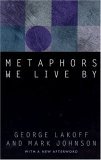


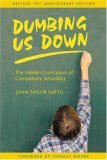

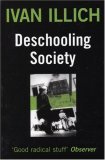



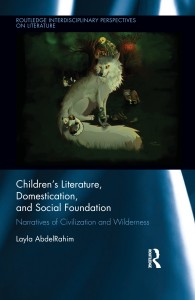
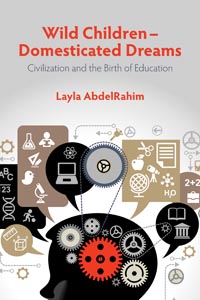
But why Moomin-trolls are not at the top of the list?
=)
I haven’t finished organising yet. I plan to have different sections for literature and theory where authors will be in alphabetical order to avoid ranking them.
Hi Layla,
I just got alittle chance to check out your wedsite, and I like it alot , very informative. I don’t have alot of time right now but I will deffinately come back again. Please email or give me a call.
hello Layla, I think of you often, just finally checking out your site. I will definitely have to visit it again. Will check out deschooling society first!
Hope you are well.
i want know what the theme of this story and what sofiya effect in the sudan what the wemen role in this novela i need small analysis for this novela
thanxs
samira
Hi, Layla!
I wonder if you read in Russian Sergej Kozlov’s stories about Bear cub, Hedgehog and their friends animals and what you think about them. May be you saw cartoons based on the stories, may be award-winning ‘Hedgehog in the Fog’ will ring a bell.
Best wishes!
N.